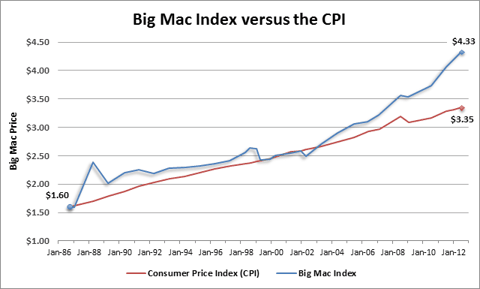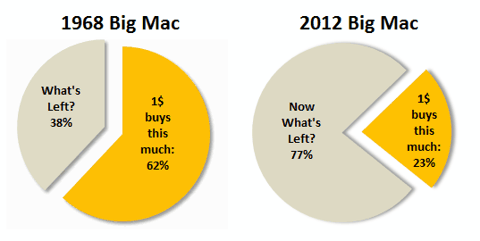A look at the trend in prices of the Big Mac clearly shows that investors are being penalized with higher inflation, lower income from bonds and certificates of deposit and being led to believe that the economy is growing better than it really is. [Let me explain.] Words: 1012; Charts: 2
So writes James Cornehlsen, CFA (www.dunnwarren.com/) in edited excerpts from his original article* entitled The Big Mac And Your Financial Health: Rising Burger Prices Show A Worrying Trend.
This article is presented compliments of www.munKNEE.com (Your Key to Making Money!) and may have been edited ([ ]), abridged (…) and/or reformatted (some sub-titles and bold/italics emphases) for the sake of clarity and brevity to ensure a fast and easy read. The author’s views and conclusions are unaltered and no personal comments have been included to maintain the integrity of the original article. Please note that this paragraph must be included in any article re-posting to avoid copyright infringement.
Cornehlsen goes on to say, in part:
The Economist… created the Big Mac Index in 1986…[which] was created to compare the price of currencies between different countries. The index is based on the theory of purchasing-power parity, which says that exchange rates should eventually adjust to make the price of a basket of goods the same in each country. The Big Mac Index basket contains just one item: the Big Mac hamburger. It works by calculating the exchange rate that would leave a Big Mac costing the same in each country. Because it contains beef, dairy (cheese), wheat (bun), cost of labor, and the cost of real estate, I believe it is a good representation of prices in the United States and abroad.
Using the Big Mac Index to Measure Inflation
[For our purposes in this article,] rather than use the Big Mac index for comparing the value of currencies between countries, we… [have graphed] the price of the Big Mac within the U.S. each year since 1986 to see how it has change over time….[and it shows (see chart below) that] prices have accelerated much faster than the official reported Consumer Price Index (CPI) from the Bureau of Labor Statistics.On the BLS’s website, CPI is defined as “a measure of the average change over time in the prices paid by consumers for a market basket of consumer goods and services. The basket includes food & beverages, housing, apparel, transportation, medical care, recreation, education & communication, and other goods & services”. However, there are two broad concerns with the CPI.
- CPI accounts for the substitution effect whereby if the price of beef increases, it is assumed that fewer people will buy beef and will instead buy chicken.
- There is a “chained” effect meaning the basket of goods isn’t consistent from one time period to the next. The reason for this is that it is believed people change their spending habits as prices change which is why the bureau of Labor Statistics instituted this policy.
The Big Mac Index vs. the Consumer Price Index
Since 1986, the price of a Big Mac has increased 171% from $1.60 to $4.33 today. During this same time period, the consumer price index has increased at a much lower rate of 109%….In 1986, $1 would have purchased over half of a Big Mac. Today you would have to cut the Big Mac into five pieces and only eat one of the five pieces for $1. Consequently, each dollar we have is buying a lot less.
Big Mac Index Implications Related to Inflation
Individuals on Social Security are provided a cost of living index. This index is based on the Consumer Price index. If an individual received $1,000 per month in 1999, they are receiving $1,360 today. In contrast, if the Big Mac Index were used, beneficiaries would be receiving $1,770. By using the consumer price index, the government is paying out $410 less than they would otherwise pay based on the rise in the price of a Big Mac….By understating inflation, the federal government is effectively reducing the amount owed to retirees and thereby cutting the long-term deficit.
Big Mac Index Implications Related to Bond Prices
Ed Easterling, founder of Crestmont Research, links inflation to the rate of interest rates. By printing money to buy bonds, the government has pushed the interest rate of a 10-year government bond down to about 1.70%. However, Ed Easterling shows that the 10-year government bond rate should be about 1% above inflation.
- The current rate of inflation reported by CPI is 1.1%.
- Adding 1% for the increased risk of holding a bond for 10 years gives you a rate of at least 2.1%, and that’s using official inflation estimates.
- If we base our calculation on the Big Mac Index, however, inflation is 3.1% and adding 1% to that for the risk of holding a bond for 10 years gets a rate of 4.1%.
- The current interest rate of a government bond is 1.7%, but if we were to account for inflation as seen by the rise in the price of a Big Mac, the interest rate should be 4.1%.
- Consequently, if 10-year government bonds were to increase from 1.7% to 4.1%, bond indices would decline by about 20%.
- In other words, long duration, 10-year government bonds are overvalued by about 20% mainly due to persistent intervention (manipulation) by the Federal Reserve.
Propping Up GDP Numbers by Underestimating Inflation
Lastly, Gross Domestic Product (GDP) is the measure used for the growth rate of the overall economy. GDP is adjusted for inflation. An understatement of assumed inflation makes the reported GDP headline number look better, and using the Big Mac Index instead of the official CPI would reduce the latest GDP growth rate of 1.26% and cause the report to show that GDP declined. Consequently, economic growth looks stronger using CPI rather than the Big Mac Index.
Conclusion
The price of a Big Mac is rising faster than the official rise in consumer prices and has been since the late 90’s….[and] foreshadows how the printing of money is eroding the financial system’s arterial walls. The impact is broad based:
- Each dollar we own is buying less.
- For individuals relying on Social Security, the compensation for inflation is not keeping up with the prices people actually pay.
- The price of bonds should be much lower if interest rates fully accounted for the rise of inflation based on the Big Mac.
- The official economic growth rate would be lower now if prices were based on the Big Mac Index.
[Bottom line:] investors are being penalized (mostly without their knowledge) with higher inflation, lower income from bonds and certificates of deposit and being led to believe that the economy is growing better than it really is….
*http://advisorperspectives.com/dshort/guest/James-Cornehlsen-121217-Big-Mac-Inflation-Risk.php
Related Articles:
1. Real-time Inflation Data is Now Available – Finally
Inflation is a significant measurement for the economic health of countries around the world but rates are often reported weeks after data is collected. To address this problem, two professors at MIT Sloan School of Management have launched the Billion Prices Project which is the first website to publish daily price indexes and provide real-time inflation estimates around the world. Words: 825
2. These 6 Charts Illustrate That Hyperinflationary Pressure in America Is Growing
The six charts I provide in this article illustrate why the hyperinflationary pressure in America is growing. This is not necessarily a forecast for hyperinflation – this is simply a demonstration that some of the precursors to a hyperinflationary cliff are building. (Words: 1001; Charts: 7)
3. Once Inflation Starts There Will Be NO Stopping It!
If inflation starts to head towards 5%, you can be sure it’s headed for 10% because they don’t have the ability to stop it now. The only antidote they have to the mess we are in, which is massively excessive debt reinforced by derivatives, is unlimited money printing. The idea that you can withdraw the punch bowl or sharply raise interest rates, it just doesn’t exist, unless you want to take a complete deflationary collapse
4. Runaway Inflation That Would Devastate USD Seems Unlikely – Here’s Why
Many investors are treating inflation as a certainty because the Fed has expanded its balance sheet to unheard of levels through its quantitative easing strategy. Some have even gone so far as to say that this program will utterly destroy the U.S. currency. To demystify this conclusion, I’m going to explain quantitative easing and why the Fed is using this monetary strategy. Afterward, I’ll explain why gold is still positioned to rise even if inflation continues to be low. Words: 786
5. Major Inflation is Inescapable and the Forerunner of an Unavoidable Depression – Here’s Why
Whether our current economic crisis will end with massive inflation or in a deflationary spiral (ultimately, either one results in a Depression) is more than an academic one. It is the single most important variable for near and intermediate term investing success. It is also important in regard to taking actions which can prepare and protect you and your family. [Here is my assessment of what the future outcome will likely be and why.] Words: 1441
6. Major Price Inflation Is Coming – It’s Just a Matter of Time! Here’s Why
The developed economies of the world have opened the money spigots…[and this] massive money and credit creation is sitting in the banking system like dry tinder just waiting for a spark to set it ablaze. How quickly it happens is anyone’s guess, but once it does we are likely to be enveloped in a worldwide inflation unlike anything before ever witnessed. [Let me explain further.] Words: 625
7. High Inflation is Coming but Hyperinflation is Highly Unlikely – Why is That?
8. A Hyperinflationary Great Depression Is Coming to America by 2014! Here’s Why







9. James Turk Interviews Robert Prechter: Which Will It Be – Hyperinflation or Massive Deflation?

10. An Inflation Inferno is Expected – but When?

11. How Likely Will Hyperinflation Occur in the U.S.?

12. 21 Countries Have Experienced Hyperinflation In Last 25 Years – Is the U.S. Next!




 munKNEE.com Your Key to Making Money
munKNEE.com Your Key to Making Money


Raising interest rates now would destroy the economy!
With Social Security recipients ONLY receiving a 1.7% COLA, a rise in interest rates would be the final straw…
Both the US Gov’t and the Fed are now bowing to the ultra wealthy instead of serving the majority of the USA!
The Fiscal Cliff is really a Fiscal Enema for the Majority of Americans that are not Wealthy!
If President Obama thinks he is helping the majority of Americans, I challenge him to POST A Chart of the TOTAL amount of LOSS to the middle class by his cave-in to the Ultra Wealthy in order to make a deal that will be trivial to the Ultra Wealthy and a huge reduction to the fiscal well being of the majority of Americans from now on…
Social Security, Medicare, and Medicaid programs are ONLY 6% of the 2013 Recommended Discretionary Spending, while the Military budget is OVER 60% (and that does not add in all the secret or “Black” programs)! If we “just” reduced our Military to about 40% it would be at 2002 levels, were we in greater danger then than now? http://www.OneMinuteForPeace.org
The Gov’t needs to end the Wars (including the War on Drugs) we are not winning and get back into making things better in the USA by rebuilding our infrastructure ASAP, before China*buys all the Earths raw materials needed to do it with.
Articles attacking Social Security, Medicare and Medicaid are nothing but a cheap shot at all those that have the least ability to defend themselves.